部编人教版八年级上册英语期末复习知识点汇总【最新整理】
人教版八年级英语上册知识点总结和复习要点
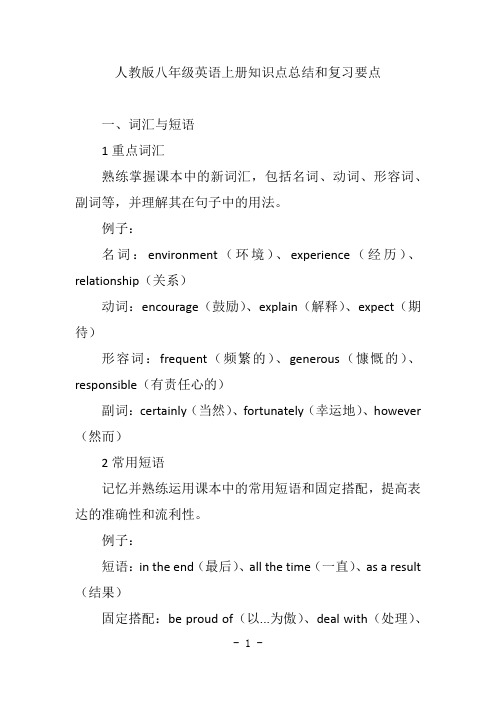
人教版八年级英语上册知识点总结和复习要点一、词汇与短语1重点词汇熟练掌握课本中的新词汇,包括名词、动词、形容词、副词等,并理解其在句子中的用法。
例子:名词:environment(环境)、experience(经历)、relationship(关系)动词:encourage(鼓励)、explain(解释)、expect(期待)形容词:frequent(频繁的)、generous(慷慨的)、responsible(有责任心的)副词:certainly(当然)、fortunately(幸运地)、however (然而)2常用短语记忆并熟练运用课本中的常用短语和固定搭配,提高表达的准确性和流利性。
例子:短语:in the end(最后)、all the time(一直)、as a result (结果)固定搭配:be proud of(以...为傲)、deal with(处理)、pay attention to(注意)二、句型与语法1基本句型熟练掌握五种基本句型,包括主语+谓语、主语+谓语+宾语、主语+谓语+间接宾语+直接宾语、主语+谓语+宾语+宾语补足语、主语+系动词+表语。
例子:主语+谓语:She sings.(她唱歌。
)主语+谓语+宾语:I like apples.(我喜欢苹果。
)主语+谓语+间接宾语+直接宾语:He gave me a book.(他给了我一本书。
)主语+谓语+宾语+宾语补足语:I found the book interesting.(我发现这本书很有趣。
)主语+系动词+表语:She is beautiful.(她很漂亮。
)2时态深入学习并掌握现在完成时、过去进行时、一般将来时、过去将来时等时态的用法和形式。
例子:现在完成时:I have already seen that movie.(我已经看过那部电影了。
)过去进行时:They were playing football when I called them.(我打电话给他们时,他们正在踢足球。
人教版八年级英语上册知识点总结(全新精编)
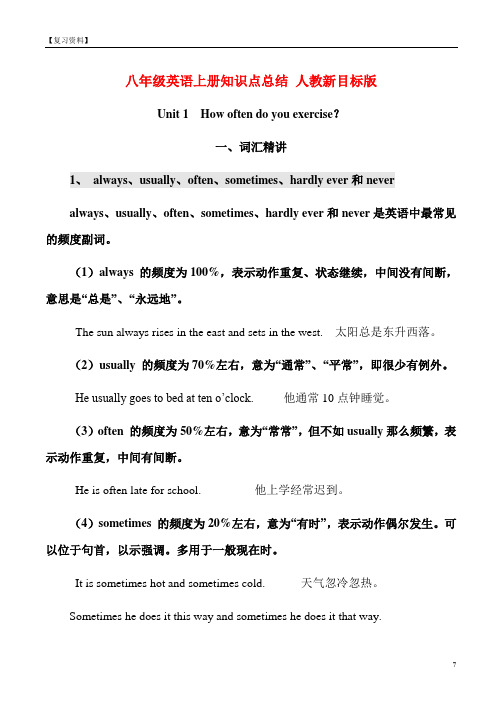
八年级英语上册知识点总结人教新目标版Unit 1 How often do you exercise?一、词汇精讲1、always、usually、often、sometimes、hardly ever和neveralways、usually、often、sometimes、hardly ever和never是英语中最常见的频度副词。
(1)always 的频度为100%,表示动作重复、状态继续,中间没有间断,意思是“总是”、“永远地”。
The sun always rises in the east and sets in the west. 太阳总是东升西落。
(2)usually 的频度为70%左右,意为“通常”、“平常”,即很少有例外。
He usually goes to bed at ten o’clock. 他通常10点钟睡觉。
(3)often 的频度为50%左右,意为“常常”,但不如usually那么频繁,表示动作重复,中间有间断。
He is often late for school. 他上学经常迟到。
(4)sometimes 的频度为20%左右,意为“有时”,表示动作偶尔发生。
可以位于句首,以示强调。
多用于一般现在时。
It is sometimes hot and sometimes cold. 天气忽冷忽热。
Sometimes he does it this way and sometimes he does it that way.他有时这样做,有时那样做。
(5)hardly ever 的频度为5%左右,意为“几乎不”、“偶尔”,表频率,位置是“行前be后”。
I hardly ever go out these days. 这些天我几乎不出门。
(6)never 的频度为0,意为“从来不”、“永不”。
My parents are never late for work. 我父母上班从来不迟到。
人教版八年级英语上册期末复习知识点总结

人教版八年级英语上册期末复习知识点总结Activities:(写出动词过去式)go on XXX去度假XXX at home待在家里go to the mountains去爬山go to the beach去海滩visit museums参观博物馆go to XXX去参观夏令营quite a few相当多study for为……而研究go out出去mostof the time大部分时间XXX good尝起来很好吃have a good time玩得高兴of course当然XXX给……的感觉;感受到XXXgo shopping去购物in the past在过去XXX四处走走because of因为one bowl of… 一碗……the next day第二天drink XXX喝茶find out找出;查明go on连续XXX photos照相XXX重要的事up e up出来不定代词有all。
each。
both。
either。
neither。
one。
none。
little。
few,many。
much。
other。
another。
some。
any。
no。
(a) few。
(a) little。
both,enough。
every等,以及由some。
any。
no和every构成的合成代词(即somebody。
anyone。
nothing等)。
在这些不定代词中,多数都能作主语、宾语、表语或定语,但是代词none以及由some。
any。
no和every构成的合成代词只能作主语、宾语或表语,不能作定语,而no和every则只用作定语。
复合不定代词:由some,any,no,every加上-body,-one,-thing组成的不定代词,叫做复合不定代词。
XXX某人something某物,某事anybody = XXX任何人XXX什么事物,任何事物,无论什么事物nobody = no one没有人,不重要的人nothing没有东西,什么也没有;不重要的人或事XXX XXX每人,人人,所有人everything每一个事物,统统词组:for nothing(徒劳,没有好结果,免费),nothing but(仅仅,只不过)。
新人教版初中英语八年级上册知识总结(最全)
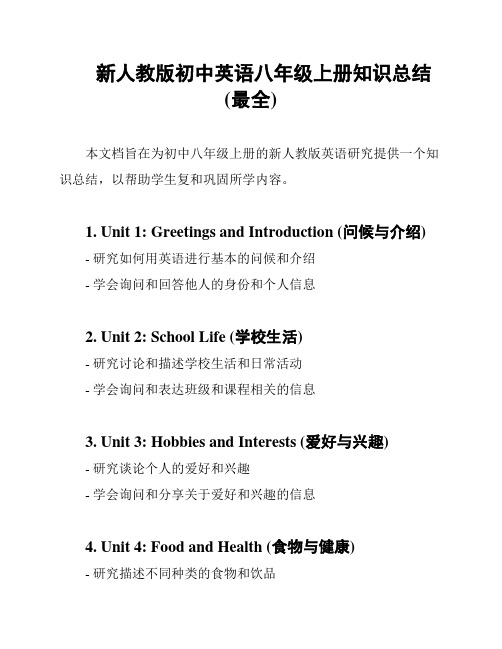
新人教版初中英语八年级上册知识总结(最全)本文档旨在为初中八年级上册的新人教版英语研究提供一个知识总结,以帮助学生复和巩固所学内容。
1. Unit 1: Greetings and Introduction (问候与介绍)- 研究如何用英语进行基本的问候和介绍- 学会询问和回答他人的身份和个人信息2. Unit 2: School Life (学校生活)- 研究讨论和描述学校生活和日常活动- 学会询问和表达班级和课程相关的信息3. Unit 3: Hobbies and Interests (爱好与兴趣)- 研究谈论个人的爱好和兴趣- 学会询问和分享关于爱好和兴趣的信息4. Unit 4: Food and Health (食物与健康)- 研究描述不同种类的食物和饮品- 学会提醒他人注意饮食健康和生活惯5. Unit 5: Festivals and Celebrations (节日与庆祝) - 研究讨论和描述各种节日和庆祝活动- 学会询问和分享关于节日和庆祝的信息6. Unit 6: Travel and Transportation (旅行与交通) - 研究谈论旅行和交通方式- 学会询问和表达关于旅行和交通的信息7. Unit 7: Daily Routines (日常作息)- 研究讨论和描述日常作息和活动安排- 学会询问和分享关于日常作息的信息8. Unit 8: Environmental Protection (环境保护)- 研究讨论和描述环境保护的重要性和方法- 学会提醒他人关于环境保护的意识和行动本文档总结了新人教版初中英语八年级上册所有单元的核心内容。
希望这个总结能帮助同学们回顾和巩固所学的知识,以便更好地应对考试和实际应用。
人教版八年级英语上册期末复习提纲6、7、9单元语法点汇总
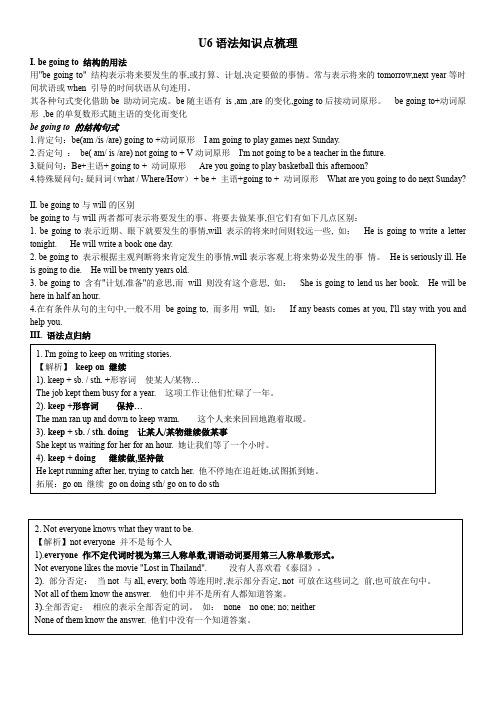
U6语法知识点梳理I. be going to 结构的用法用"be going to" 结构表示将来要发生的事,或打算、计划,决定要做的事情。
常与表示将来的tomorrow,next year等时间状语或when 引导的时间状语从句连用。
其各种句式变化借助be 助动词完成。
be随主语有is ,am ,are的变化,going to后接动词原形。
be going to+动词原形,be的单复数形式随主语的变化而变化be going to 的结构句式1.肯定句:be(am /is /are) going to +动词原形I am going to play games next Sunday.2.否定句:be( am/ is /are) not going to + V动词原形I'm not going to be a teacher in the future.3.疑问句:Be+主语+ going to + 动词原形Are you going to play basketball this afternoon?4.特殊疑问句:疑问词(what / Where/How)+ be + 主语+going to + 动词原形What are you going to do next Sunday?II. be going to与will的区别be going to与will两者都可表示将要发生的事、将要去做某事,但它们有如下几点区别:1. be going to表示近期、眼下就要发生的事情,will 表示的将来时间则较远一些, 如:He is going to write a letter tonight. He will write a book one day.2. be going to 表示根据主观判断将来肯定发生的事情,will表示客观上将来势必发生的事情。
He is seriously ill. He is going to die. He will be twenty years old.3. be going to 含有"计划,准备"的意思,而will 则没有这个意思, 如:She is going to lend us her book. He will be here in half an hour.4.在有条件从句的主句中,一般不用be going to, 而多用will, 如:If any beasts comes at you, I'll stay with you and help you.III. 语法点归纳Unit 7 语法知识点梳理◆一般将来时常与一些表示将来的时间状语连用如: tomorrow (明天), next week (下周), from now on (从现在开始);in the future (将来)等。
新人教版八年级上册英语全册期末复习必背知识点归纳
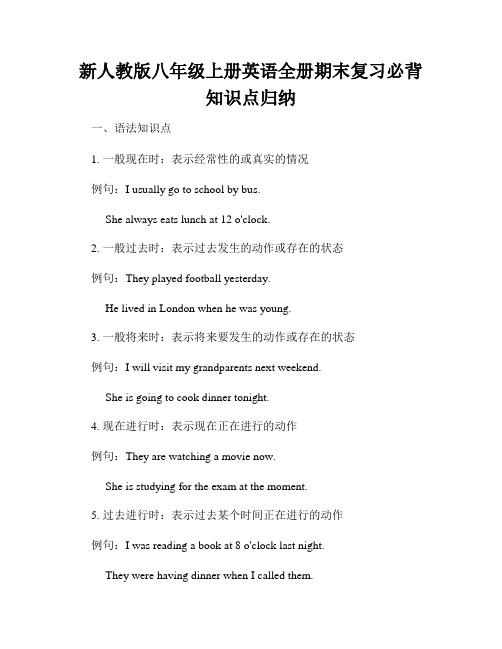
新人教版八年级上册英语全册期末复习必背知识点归纳一、语法知识点1. 一般现在时:表示经常性的或真实的情况例句:I usually go to school by bus.She always eats lunch at 12 o'clock.2. 一般过去时:表示过去发生的动作或存在的状态例句:They played football yesterday.He lived in London when he was young.3. 一般将来时:表示将来要发生的动作或存在的状态例句:I will visit my grandparents next weekend.She is going to cook dinner tonight.4. 现在进行时:表示现在正在进行的动作例句:They are watching a movie now.She is studying for the exam at the moment.5. 过去进行时:表示过去某个时间正在进行的动作例句:I was reading a book at 8 o'clock last night.They were having dinner when I called them.6. 情态动词 can 和 could:表示能力或许可例句:I can swim very well.He could speak three languages when he was young. 7. 情态动词 must 和 have to:表示义务、必须或强制性例句:You must finish your homework before going out.I have to wake up early tomorrow.8. 情态动词 should:表示建议或应该例句:You should eat more vegetables for better health. She should go to bed early for enough sleep.9. 动词不定式:表示目的、原因、结果或时态等例句:I went to the supermarket to buy some fruits.She is happy to hear the good news.二、词汇知识点1. 人称代词:用于代替特定人或物例句:He is my brother.They are good friends.2. 数词:表示数量的词语例句:There are ten students in the classroom.I have two cats and three dogs.3. 形容词:修饰名词或代词,描述人或物的特征例句:She is a beautiful girl.This is a big house.4. 副词:修饰动词、形容词、副词等,表示时间、地点、程度等例句:She runs fast.He speaks English fluently.5. 介词:介绍名词与其他词语之间的关系例句:I have a pen in my bag.The book is on the table.6. 连词:连接句子、词组或单词例句:I like swimming and playing basketball.She can play the guitar or the piano.7. 冠词:用于限定名词例句:I have an apple.The book on the table is mine.三、题型解析1. 完形填空题:根据上下文意思,选出合适的单词填空Tom: What's your favorite ________?Emily: I like watching ________.Tom: Me too. Let's go to the ________ tonight.A. colorB. movieC. sportD. book答案:B2. 阅读理解题:阅读短文,回答相关问题例题:My name is Lucy. I am twelve years old. I ________ to school every day. My favorite ________ is English. I like playing basketball ________ school. My dream is to become a ________ in the future.What does Lucy like playing?A. basketballB. soccerC. tennisD. volleyball答案:A3. 选择填空题:选择合适的单词或短语填空例题:Lucy: What's your ________ food, Tom?Tom: I like ________ because it tastes delicious.A. favoriteB. leastC. difficultD. easy4. 任务型阅读题:根据文章内容,完成相应的任务例题:请你根据短文内容,回答以下问题:What is the main idea of the passage?答案:The passage is about Lucy's daily life and her dream.四、写作技巧1. 写作时要注意使用适当的句式和词汇,使文章更加丰富多样。
最新人教版八年级英语上册复习要点(全册重点句型及语法)

最新人教版八年级英语上册复习要点(全册重点句型及语法)Unit 1 Where did you go on vacation?重点短语:(1)go on vacation 去度假(2)stay at home 呆在家(3)go to the mountains 去爬山(4)go to the beach去沙滩(5)visit museums 参观博物馆(6)go to summer camp 去夏令营(7)quite a few 相当多,不少(8)study for……为…而学习(9)go out 出去(10)most of the time 大多数时间(11)taste good 尝起来不错(12)have a good time过得愉快(13)feel like 感受到(14)go shopping 去买东西(15)in the past 在过去(16)walk around…..四处走走(17)too many 太多(18)because of+短语因为(19)one bowl of 一碗。
(20)find out 查明,弄清(21)take photos 照相(22)something important 重要的事情(23)up and down 上上下下(24)come up 上来(25)of course 当然(26)come down 下来重点语法:(1)Where did you go on vacation? I went to New York City.(2)Did you go out with anyone? No, No one was here. Everyone was on vacation.(3)Did you buy anything special? Yes, I bought something for my father. (4)How was the food? Everything tasted really good.(5)Did everyone have a good time? Oh,yes. Everything was excellent.习惯用法:(1)buy sth for sb./ buy sb. sth 为某人买某物(2)taste + adj. 尝起来……(3)nothing ….but + V.(原形)除了…之外什么都没有(4)seem + (to be) + adj 看起来(5). arrive in + 大地方arrive at + 小地方到达某地(6)decide to do sth. 决定做某事(7). try doing sth. 尝试做某事(8)try to do sth. 尽力做某事(9)try one`s best to do sth尽力做某事(10)enjoy doing sth. 喜欢做某事(11)want to do sth.想去做某事(12)start doing sth. 开始做某事(13)stop doing sth.停止做某事stop to do sth停下来做某事(14)look + adj 看起来(15)dislike doing sth. 不喜欢做某事(16)Why not do sth. 为什么不做…….呢?(17)so + adj + that + 从句如此…以至于第 1 页共 1 页(18)tell sb. (not) to do sth. 告诉某人(不要)做某事(19)keep doing sth. 继续做某事(20).forget to do sth. 忘记去做某事(未做)forget doing sth忘记做过某事(已做)词语辨析:○1anywhere 与somewhere两者都是不定副词。
最全面人教版八年级上册英语期末总复习归纳整理
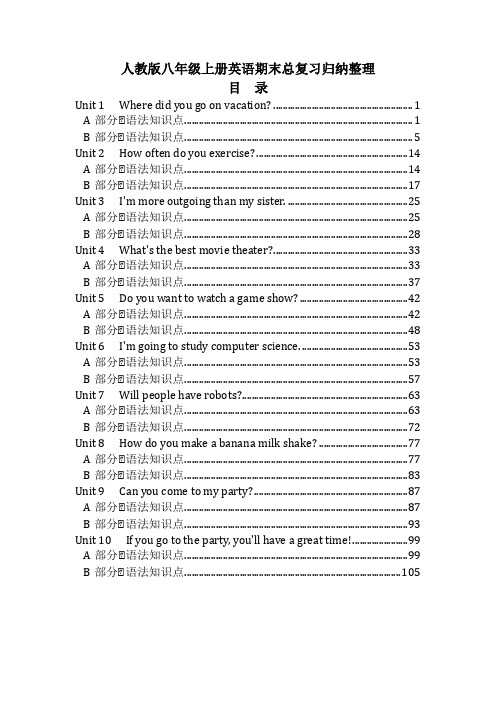
人教版八年级上册英语期末总复习归纳整理目录Unit 1 Where did you go on vacation? (1)A部分━语法知识点 (1)B部分━语法知识点 (5)Unit 2 How often do you exercise? (14)A部分━语法知识点 (14)B部分━语法知识点 (17)Unit 3 I'm more outgoing than my sister. (25)A部分━语法知识点 (25)B部分━语法知识点 (28)Unit 4 What's the best movie theater? (33)A部分━语法知识点 (33)B部分━语法知识点 (37)Unit 5 Do you want to watch a game show? (42)A部分━语法知识点 (42)B部分━语法知识点 (48)Unit 6 I'm going to study computer science. (53)A部分━语法知识点 (53)B部分━语法知识点 (57)Unit 7 Will people have robots? (63)A部分━语法知识点 (63)B部分━语法知识点 (72)Unit 8 How do you make a banana milk shake? (77)A部分━语法知识点 (77)B部分━语法知识点 (83)Unit 9 Can you come to my party? (87)A部分━语法知识点 (87)B部分━语法知识点 (93)Unit 10 If you go to the party, you'll have a great time! (99)A部分━语法知识点 (99)B部分━语法知识点 (105)Unit 1 Where did you go on vacation?A部分━语法知识点(1)复合不定代词的用法1、复合不定代词只相当于名词,在句子中可作主语、宾语、表语,不能作定语(即不具有形容词的性质)。
- 1、下载文档前请自行甄别文档内容的完整性,平台不提供额外的编辑、内容补充、找答案等附加服务。
- 2、"仅部分预览"的文档,不可在线预览部分如存在完整性等问题,可反馈申请退款(可完整预览的文档不适用该条件!)。
- 3、如文档侵犯您的权益,请联系客服反馈,我们会尽快为您处理(人工客服工作时间:9:00-18:30)。
部编人教版八年级上册英语期末复习知识点汇总Unit 1 Where did you go on vacation?重点短语:(1)go on vacation 去度假(2)stay at home 呆在家(3)go to the mountains 去爬山(4)go to the beach 去沙滩(5)visit museums 参观博物馆(6)go to summer camp 夏令营(7)quite a few 相当多,不少(8)study for …… 为…而学习(9)go out 出去(10)most of the time 大多数时间(11)taste good 尝起来不错(12)have a good time 过得愉快(13)feel like 感受到(14)go shopping 去买东西(15)in the past 在过去(16)walk around …..四处走走(17)too many 太多(18)because of+短语因为(19)one bowl of 一碗。
(20)find out 查明,弄清(21)take photos 照相(22)something important 重要的事情(23)up and down 上上下下(24)come up 上来,出现(25)of course 当然(26)come down下来重点语法:(1)Where did you go on vacation? I went to New York City.(2)Did you go out with anyone? No, No one was here. Everyone was on vacation. (3)Did you buy anything special? Yes, I bought something for my father. (4)How was the food? Everything tasted really good. (5)Did everyone have a good time? Oh ,yes. Everything was excellent. 习惯用法:(1)buy sth for sb./ buy sb. sth 为某人买某物(2)taste + adj. 尝起来……(3)nothing ….but + V.(原形) 除了…之外什么都没有(4)seem + (to be) + adj 看起来(5)arrive in + 大地方arrive at + 小地方到达某地(6)decide to do sth. 决定做某事(7)try doing sth. 尝试做某事(8)try to do sth. 尽力做某事------精选范文、公文、论文、和其他应用文档,如需本文,请下载-----2(9)try one`s best to do sth 尽力做某事(10)enjoy doing sth. 喜欢做某事(11)want to do sth. 想去做某事(12)start doing sth. 开始做某事(13)stop doing sth. 停止做某事 stop to do sth 停下来做某事(14)look + adj 看起来(15)dislike doing sth. 不喜欢做某事(16)Why not do sth. 为什么不做…….呢?(17)so + adj + that + 从句如此…以至于(18)tell sb. (not) to do sth. 告诉某人(不要)做某事(19)keep doing sth. 继续做某事(20)forget to do sth. 忘记去做某事(未做) forget doing sth 忘记做过某事(已做)词语辨析:○1. anywhere 与 somewhere 两者都是不定副词。
anywhere 在任何地方(否定句和疑问句) I can ’t find it anywhere.somewhere 在某处,到某处,常用于肯定句。
I lost my key somewhere near here. ○2 seem + 形容词看起来….. You seem happy today.seem + to do sth. 似乎、好像做某事 I seems / seemed + that 来好像…;似乎…. seem like ….好像,似乎….. It seems like a god idea.○3. decide to do sth.决定做某事 They decide to visit the museum. decide + 疑问词 + 动词不定式He can not decide when to leave. ○4. start doing sth = start to do sth. 开始 He started doing his homework.○5. ove r 多于,超过,在…以上(表示数目、程度) = more thanMy father is over 40 years old. ○6. too many 太多,后接可数名词复数: Mother bought too many eggs yesterday. too much 太多,修饰不可数名词We have too much work to do. Don ’t talk too much.○7. because of 因为,由于,接名词、代词或动名词 He can ’t take a walk because of the rain. because 连词,因为,引导状语从句I don ’t buy it because it was too expensive. ○8. too,…to 太….以至于不能…. Mother is too tired to go to school. ○9. have fun doing sth 享受做某事的乐趣 Unit 2 How often do you exercise?短语:(1)help sb with sth帮助某人做某事(2)go shopping 去买东西(3)on weekends 在周末(4)how often 多少次(5)hardly ever 几乎从不(6)once a week 一星期一次(7)twice a month 一个月两次(8)go to the movies 去看电影(9)every day 每天(10)use the Internet 上网(11)be free =be not busy------精选范文、公文、论文、和其他应用文档,如需本文,请下载-----3=have time 有空(12)have dance lessons 舞蹈课(13)swing dance 摇摆舞(14)play tennis 打网球(15)stay up late 熬夜到很晚(16)go to sleep 睡觉(17)go to bed 上床睡觉(18)at least 至少,不少于(19)go to bed early 上床睡觉早(20)play sports 做运动(21)be good for 对….有好处(22)be good at doing sth擅长做某事(23)go camping 去野营(24)in one ’s free time在某人的业余时间(25)the most popular 最受欢迎(26)such as 例如….像….这样(27)go to the dentist 看牙科医生(28)more than 多于(29)old habits die hard旧习难改(30)less than 少于(31)junk food 垃圾食品(32)take care of sb 照料某人(33)look after sb 照顾某人(34)have to do sth 必须做某事(35)get in …进入… (36)be late for 迟到语法要点:(1)What do you usually do on weekends? I always exercise.(2)What do they do on weekends? They often help my mother with housework. (3)What does she do on weekends? She sometimes goes shopping.(4)How often do you go to the movies? I go to the movies maybe once a month. (5)How often does he watch TV? He hardly ever watches TV. (6)Do you go shopping? No, I never go shopping. 习惯用法:1. help sb. with sth =have sb do sth 帮助某人做某事2. How about doing …? ….怎么样?/ ….好不好?3. want sb. to do sth. 想让某人做某事4. How many + 可数名词复数+ 一般疑问句5. 主语+ find+ that 从句发现…6. It ’s + adj.+ to do sth. 做某事是….的7. spend time with sb. 和某人一起度过时光8. ask sb. about sth. 向某人询问某事9. by doing sth. 通过做某事10. What ’s your favorite …..?你最喜欢的…是什么?11 start doing sth. 开始做某事12. the best way to do sth. 做某事的最好方式 13.full of 满的14.what about doing sth ?做某事怎么样?15.not ….at all 一点儿也不I don`t like it at all. 我一点儿也不喜欢它。
词语辨析:1. free 空闲的,有空的,反义词为 busy.be free 有空,闲着,相当于 have time.I ’ll be free next week. = I ’ll have time next week.------精选范文、公文、论文、和其他应用文档,如需本文,请下载-----42. How come ?怎么会?怎么回事?How come Tom didn ’t come to the party? = Why didn ’t Tom come to the party?3. stay up late 指“熬夜到很晚,迟睡”。
